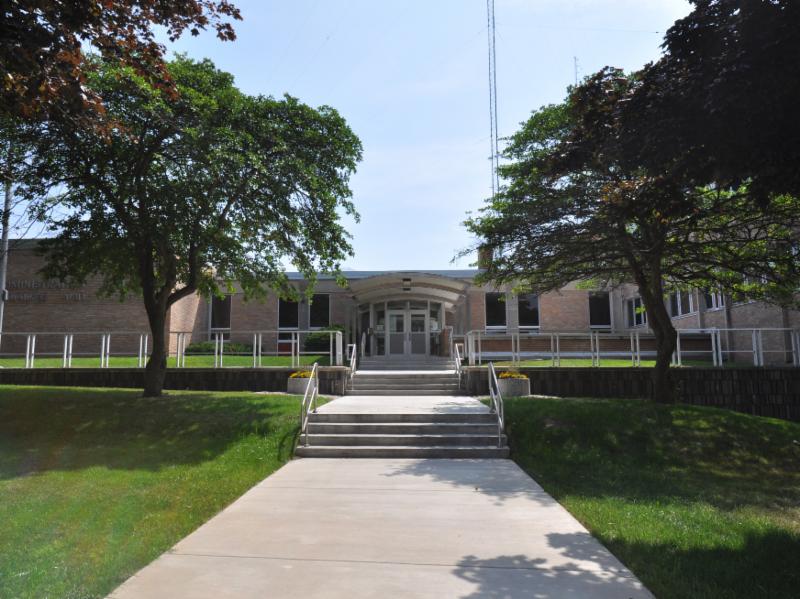County leaders have limited options to address 2018 budget shortfall
The proposed increase in the VRF – from $30 to $60 – would generate an additional $14.6 million in 2018, which would be used mainly to preserve existing levels of transit service.
The Public Policy Forum‘s annual analysis of the Milwaukee County Executive’s recommended budget finds that the 2018 proposal largely averts service cuts, which is no easy task given the $30.9 million budget deficit facing the County in the coming year. The trade-off, however, is more than $19 million of new or enhanced fees, including a proposed $30 increase in the vehicle registration fee (VRF) that contradicts the results of an advisory referendum last April.
“This appears to reflect – for the second consecutive year – a determination that significant service and staff reductions and new outsourcing initiatives no longer are palatable after years of reliance on such strategies, and that revenue enhancements represent the ‘least bad’ of the County’s difficult deficit reduction options,” says the report.
The proposed increase in the VRF – from $30 to $60 – would generate an additional $14.6 million in 2018, which would be used mainly to preserve existing levels of transit service. In addition, the VRF revenue frees up property tax resources from the transit budget that can be spread among other County functions to similarly avoid service cuts. The budget also recommends $4.7 million in other new or enhanced fees, including new parking fees at County parks, transit fare increases for regular users, increased Milwaukee County Zoo admissions charges, and increased fees for phone calls made by Jail and House of Correction inmates.
The budget brief points out that there are alternative options on the expenditure side, though those inevitably would need to include service reductions in discretionary areas like parks, culture, and transit.
“While we have suggested for years that a balanced approach involving both expenditure reductions and revenue enhancements is the most appropriate solution to the County’s severe structural challenges, it is fair to ask whether that balance has shifted too far to the revenue side in the recommended budget,” says the report. “The issue is not that $19 million in new revenue is not needed…(it) instead is whether the fee increases should be accompanied by expenditure reductions – which admittedly would involve real cuts in service – as a means of taking an even bigger bite out of the structural deficit and/or allowing the proposed fee increases to be phased in more gradually.”
The report adds that it would have been beneficial for the April advisory referendum on the VRF to delineate the County’s limited options to eliminate the 2018 budget gap, “as that would have made it a more valid barometer of public sentiment.”
While the proposed VRF and other fee increases are likely to be the most contentious items in the recommended budget, the report also analyzes several additional key elements. For example, it points out that despite major investments in a new international airport terminal and much-needed bus replacements, the recommended capital budget only addresses a fraction of the County’s overwhelming infrastructure needs. And, on the operating side, while new investments are proposed to address opioid challenges and for programs serving delinquent youth, the homeless, and persons suffering from mental illness, a perennial hole in the Sheriff’s budget is not fully addressed.
The report concludes by noting the recent progress the County has made in reducing its decades-long structural imbalance by lowering debt service payments, trimming health care costs, and cutting staff. Nevertheless, stagnant revenue streams, escalating retirement obligations, and a huge infrastructure backlog pose formidable obstacles. The budget brief emphasizes that decisions on the appropriate mix of expenditure reductions and revenue enhancements in the 2018 budget must be made with the County’s long-term financial challenges in mind.
“Without question, the worst possible outcome would be an avoidance of difficult choices by delaying additional needed capital projects, depleting reserves, or ignoring legally-bound obligations to retirees,” warns the report. “Kicking the can down the road is not a solution and only would erode the recent financial achievements that have resulted from responsible action by both branches of County government.”
The County budget brief can be downloaded at www.publicpolicyforum.org. The Forum’s 2018 City of Milwaukee budget brief will be released in the near future.
Milwaukee-based Public Policy Forum, established in 1913 as a local government watchdog, is a nonpartisan, nonprofit organization dedicated to enhancing the effectiveness of government and the development of southeastern Wisconsin through objective research of public policy issues.
NOTE: This press release was submitted to Urban Milwaukee and was not written by an Urban Milwaukee writer. While it is believed to be reliable, Urban Milwaukee does not guarantee its accuracy or completeness.
Mentioned in This Press Release
Recent Press Releases by Public Policy Forum
Report provides detailed look at school district performance and finances in southeast Wisconsin
Dec 22nd, 2017 by Public Policy ForumThe report notes that 2016-17 marks a year of relative stability when it comes to assessing district and school performance.
Wisconsin Taxpayers Alliance and Public Policy Forum Unveil New Name Merged Organization Will Be Wisconsin Policy Forum
Dec 21st, 2017 by Public Policy ForumThe two organizations will officially merge on January 1.
Metro Milwaukee’s teacher workforce shows increased stability
Dec 1st, 2017 by Public Policy ForumBut departing teachers are increasingly younger and newer to the profession























